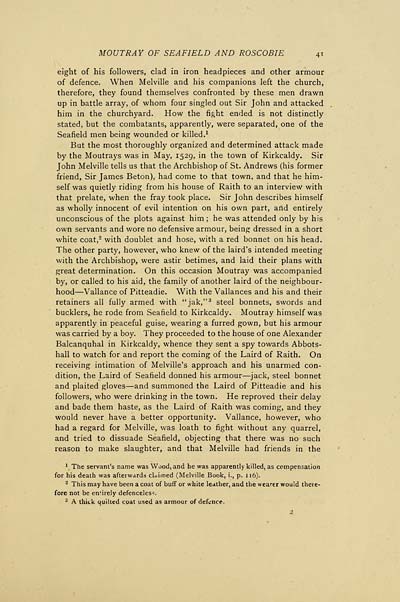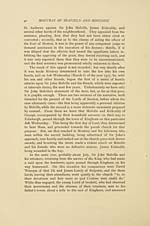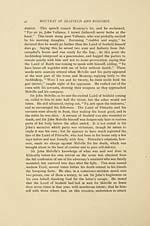Download files
Complete book:
Individual page:
Thumbnail gallery: Grid view | List view

MOUTRAY OF SEA FIELD AND ROSCOBIE 41
eight of his followers, clad in iron headpieces and other armour
of defence. When Melville and his companions left the church,
therefore, they found themselves confronted by these men drawn
up in battle array, of whom four singled out Sir John and attacked
him in the churchyard. How the fight ended is not distinctly
stated, but the combatants, apparently, were separated, one of the
Seafield men being wounded or killed. 1
But the most thoroughly organized and determined attack made
by the Moutrays was in May, 1529, in the town of Kirkcaldy. Sir
John Melville tells us that the Archbishop of St. Andrews (his former
friend, Sir James Beton), had come to that town, and that he him-
self was quietly riding from his house of Raith to an interview with
that prelate, when the fray took place. Sir John describes himself
as wholly innocent of evil intention on his own part, and entirely
unconscious of the plots against him ; he was attended only by his
own servants and wore no defensive armour, being dressed in a short
white coat, 2 with doublet and hose, with a red bonnet on his head.
The other party, however, who knew of the laird's intended meeting
with the Archbishop, were astir betimes, and laid their plans with
great determination. On this occasion Moutray was accompanied
by, or called to his aid, the family of another laird of the neighbour-
hood — Vallance of Pitteadie. With the Vallances and his and their
retainers all fully armed with "jak," 3 steel bonnets, swords and
bucklers, he rode from Seafield to Kirkcaldy. Moutray himself was
apparently in peaceful guise, wearing a furred gown, but his armour
was carried by a boy. They proceeded to the house of one Alexander
Balcanquhal in Kirkcaldy, whence they sent a spy towards Abbots-
hall to watch for and report the coming of the Laird of Raith. On
receiving intimation of Melville's approach and his unarmed con-
dition, the Laird of Seafield donned his armour — jack, steel bonnet
and plaited gloves— and summoned the Laird of Pitteadie and his
followers, who were drinking in the town. He reproved their delay
and bade them haste, as the Laird of Raith was coming, and they
would never have a better opportunity. Vallance, however, who
had a regard for Melville, was loath to fight without any quarrel,
and tried to dissuade Seafield, objecting that there was no such
reason to make slaughter, and that Melville had friends in the
1 The servant's name was Wood, and he was apparently killed, as compensation
for his death was afterwards claimed (Melville Book, i., p. 116).
2 This may have been a coat of buff or white leather, and the wearer would there-
fore not be en'irely defenceless.
3 A thick quilted coat used as armour of defence.
2
eight of his followers, clad in iron headpieces and other armour
of defence. When Melville and his companions left the church,
therefore, they found themselves confronted by these men drawn
up in battle array, of whom four singled out Sir John and attacked
him in the churchyard. How the fight ended is not distinctly
stated, but the combatants, apparently, were separated, one of the
Seafield men being wounded or killed. 1
But the most thoroughly organized and determined attack made
by the Moutrays was in May, 1529, in the town of Kirkcaldy. Sir
John Melville tells us that the Archbishop of St. Andrews (his former
friend, Sir James Beton), had come to that town, and that he him-
self was quietly riding from his house of Raith to an interview with
that prelate, when the fray took place. Sir John describes himself
as wholly innocent of evil intention on his own part, and entirely
unconscious of the plots against him ; he was attended only by his
own servants and wore no defensive armour, being dressed in a short
white coat, 2 with doublet and hose, with a red bonnet on his head.
The other party, however, who knew of the laird's intended meeting
with the Archbishop, were astir betimes, and laid their plans with
great determination. On this occasion Moutray was accompanied
by, or called to his aid, the family of another laird of the neighbour-
hood — Vallance of Pitteadie. With the Vallances and his and their
retainers all fully armed with "jak," 3 steel bonnets, swords and
bucklers, he rode from Seafield to Kirkcaldy. Moutray himself was
apparently in peaceful guise, wearing a furred gown, but his armour
was carried by a boy. They proceeded to the house of one Alexander
Balcanquhal in Kirkcaldy, whence they sent a spy towards Abbots-
hall to watch for and report the coming of the Laird of Raith. On
receiving intimation of Melville's approach and his unarmed con-
dition, the Laird of Seafield donned his armour — jack, steel bonnet
and plaited gloves— and summoned the Laird of Pitteadie and his
followers, who were drinking in the town. He reproved their delay
and bade them haste, as the Laird of Raith was coming, and they
would never have a better opportunity. Vallance, however, who
had a regard for Melville, was loath to fight without any quarrel,
and tried to dissuade Seafield, objecting that there was no such
reason to make slaughter, and that Melville had friends in the
1 The servant's name was Wood, and he was apparently killed, as compensation
for his death was afterwards claimed (Melville Book, i., p. 116).
2 This may have been a coat of buff or white leather, and the wearer would there-
fore not be en'irely defenceless.
3 A thick quilted coat used as armour of defence.
2
Set display mode to:
![]() Universal Viewer |
Universal Viewer | ![]() Mirador |
Large image | Transcription
Mirador |
Large image | Transcription
Images and transcriptions on this page, including medium image downloads, may be used under the Creative Commons Attribution 4.0 International Licence unless otherwise stated. ![]()
| Histories of Scottish families > Moutray of Seafield and Roscobie, now of Favour Royal, Co. Tyrone > (13) Page 41 |
|---|
| Permanent URL | https://digital.nls.uk/94950754 |
|---|
| Description | A selection of almost 400 printed items relating to the history of Scottish families, mostly dating from the 19th and early 20th centuries. Includes memoirs, genealogies and clan histories, with a few produced by emigrant families. The earliest family history goes back to AD 916. |
|---|

